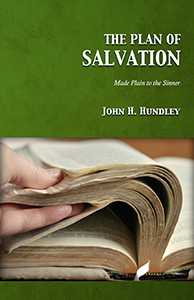
When we have obeyed from the heart, that form of doctrine, we are then made free from sin, and become the servants of righteousness. See Romans, chap. 6, ver. 17-18. This makes the whole matter plain as a sunbeam. Every man, woman and child can know the precise moment when his or her sins are forgiven them. They do not have to resort to dreams and visions—they have a more sure word of prophecy, even a written revelation dictated by the Holy Spirit, which they can always take with them everywhere they go, and show to those who demand of them a reason for the hope that is in them.
The above post is an excerpt from the book, The Plan of Salvation: Made Plain to the Sinner by John H. Hundley. Follow the link to learn more about the book and purchase your copy today!
 We would like to announce our newest title –
We would like to announce our newest title –